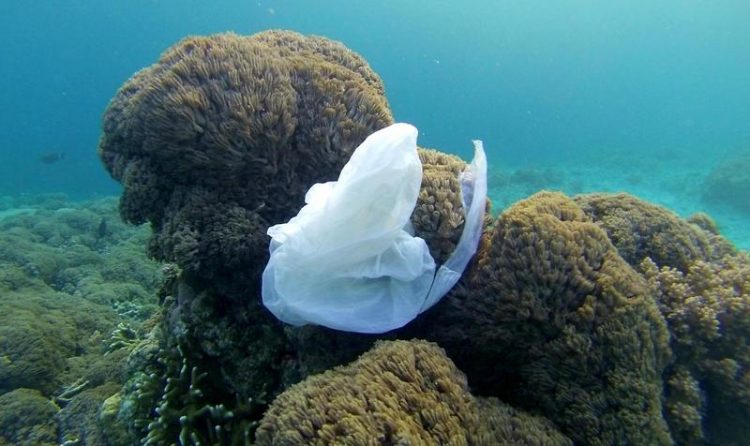Making Oceans Plastic Free – Project tackles the problem of plastic pollution in the oceans

The problem of plastic pollution in the oceans © Making Oceans Plastic Free
Indonesia is the second largest source of plastic pollution to the world’s oceans. Around 10 million plastic bags are used here every day. At present, no promising approach exists to solve the problem.
The social scientist Spranz is also exploring this topic in his doctoral thesis. In co-operation with the non-governmental organization Eco-Bali, he started a research project three years ago to study which incentives might motivate people on Bali to use fewer plastic bags. In the small Indonesian shops, the warungs, where people do their daily shopping, the plastic bags are ubiquitous, and they often land on rubbish dumps at one of the beaches after use.
With his three colleagues, Spranz founded the initiative “Making Oceans Plastic Free” in 2016. Their current project: the reusable shopping bag Tasini. In Indonesian “Tasini” means “this bag” and is supposed to be the answer when you are asked in the shop if you want a plastic bag.
The foldable bag has been designed in the shape of small marine animals to motivate as many locals as possible to use the bag. The design connects with Asian cultures’ love for fun fashion accessories, and is practical and convenient: the bag can be folded and attached to a key chain so that it is always with you. A single Tasini can replace up to 400 plastic bags a year.
“Active environmental protection is often about telling people what they should and shouldn’t do,” said Spranz. “That's why it often has a negative connotation. We believe that it is more effective and motivating when environmental protection is fun for people.”
Sea creatures suffer particularly from the consequences of plastic pollution. The small turtles, octopuses, sharks and rays in the form of shopping bags shall function as eco-ambassadors and raise awareness for this topic.
In a first step, 1,000 Tasini prototypes have been manufactured and tested. Now the project is set to go in series production. On 30 May 2017, the project will be launched on the crowdfunding platform “Indiegogo”.
The goal is the production of Tasini shopping bags made of recycled plastic waste (PET) in Indonesia under high environmental and social standards and the launch of a large-scale environmental awareness campaign. In Indonesia, the initiative is working with the local youth project “Bye Bye Plastic Bags”. The two sisters who founded this project will speak at the UN General Assembly on 8 June, World Oceans Day.
Contact:
Roger Spranz
Mail: roger.spranz@leibniz-zmt.de
Tel: +62 812 96 66 37 33
Prof. Dr. Achim Schlüter
Leibniz Centre for Tropical Marine Research (ZMT)
Mail: achim.schlueter@leibniz-zmt.de
Tel: 0421 – 23800-104 / Handy: 017792 – 53960
About the Leibniz Centre for Tropical Marine Research
In research and education the Leibniz Centre for Tropical Marine Research (ZMT) in Bremen is dedicated to the better understanding of tropical coastal ecosystems. As an interdisciplinary Leibniz institute the ZMT conducts research on the structure and functioning of tropical coastal ecosystems and their reaction to natural changes and human interactions. It aims to provide a scientific basis for the protection and sustainable use of these ecosystems. The ZMT works in close cooperation with partners in the tropics, where it supports capacity building and the development of infrastructures in the area of sustainable coastal zone management. The ZMT is a member of the Leibniz Association.
Link to Crowdfunding Campaign on Indiegogo:
https://www.indiegogo.com/projects/tasini-the-key-to-break-the-plastic-bag-habit
Link to video about Tasini initiative on YouTube: https://www.youtube.com/watch?v=gmQqGIxpM1Q
Media Contact
More Information:
http://www.leibniz-zmt.deAll latest news from the category: Ecology, The Environment and Conservation
This complex theme deals primarily with interactions between organisms and the environmental factors that impact them, but to a greater extent between individual inanimate environmental factors.
innovations-report offers informative reports and articles on topics such as climate protection, landscape conservation, ecological systems, wildlife and nature parks and ecosystem efficiency and balance.
Newest articles

Properties of new materials for microchips
… can now be measured well. Reseachers of Delft University of Technology demonstrated measuring performance properties of ultrathin silicon membranes. Making ever smaller and more powerful chips requires new ultrathin…

Floating solar’s potential
… to support sustainable development by addressing climate, water, and energy goals holistically. A new study published this week in Nature Energy raises the potential for floating solar photovoltaics (FPV)…

Skyrmions move at record speeds
… a step towards the computing of the future. An international research team led by scientists from the CNRS1 has discovered that the magnetic nanobubbles2 known as skyrmions can be…





















